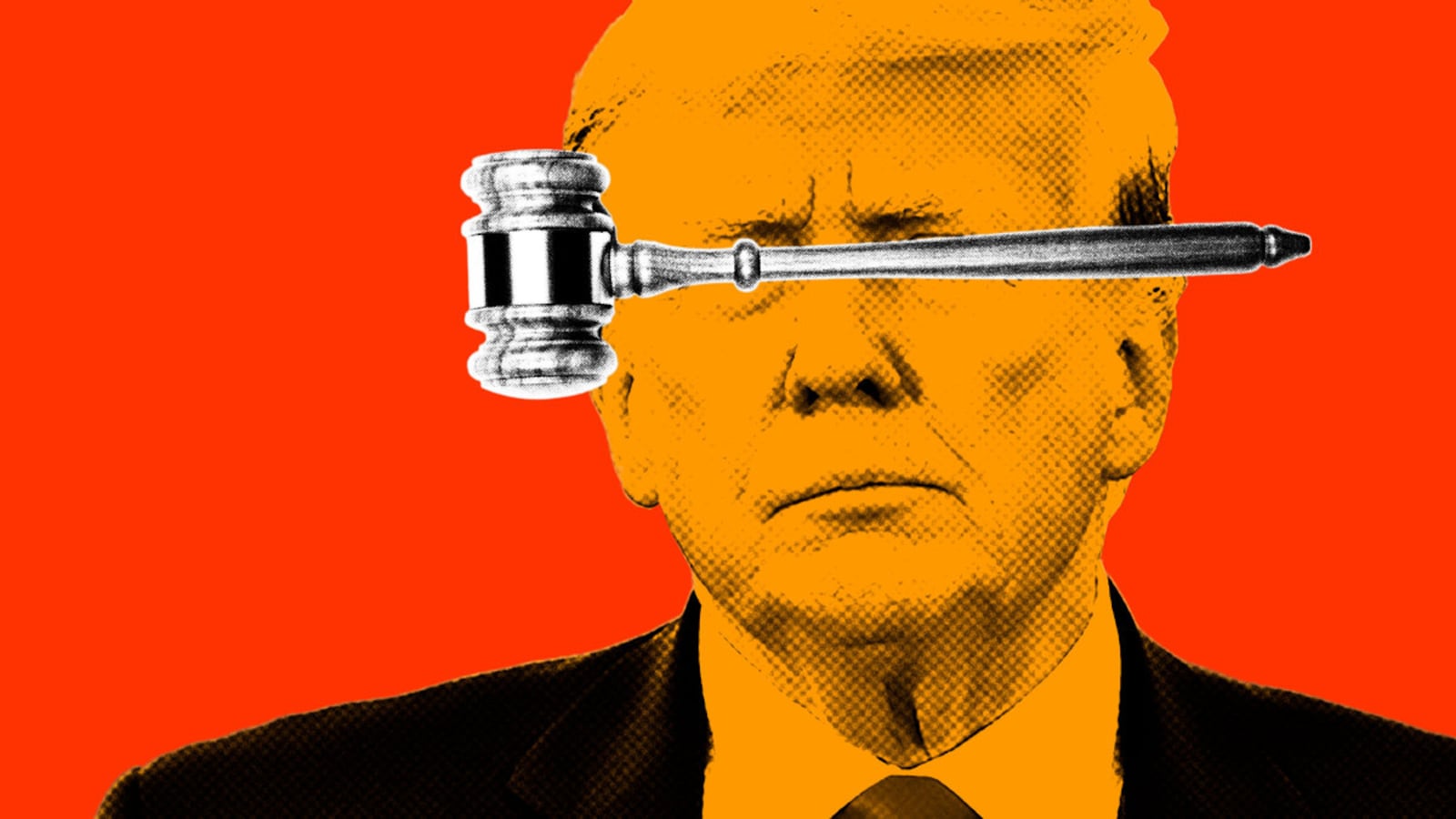Donald Trump is still so bitter over the way a South Florida federal judge ripped him to pieces earlier this year—and slapped him with a $1 million fine—that the former president is again trying to boot the judge from overseeing his revenge lawsuit against Hillary Clinton.
It’s a legal battle that questions whether a judge went too far in trying to halt Trump’s attempts to poison the nation’s institutions, and if this judge-targeting strategy could work to tie up the criminal cases now dogging Trump’s presidential ambitions.
U.S. District Judge Donald M. Middlebrooks is the object of Trump’s ire—all for losing his patience with the former president’s relentless firehose of aggrieved nonsense.
“There’s no question he’s pissed at Trump. He’s irritated at the lawyers too. He’s disgusted. This lawsuit is just an extension of a political argument filed in court,” said Stefanie Lindquist, a professor at the Sandra Day O'Connor College of Law at Arizona State University.
But, she added, the judge “very well” may have crossed the line.
Seven years on from the 2016 election he won, Trump remains obsessed with seeking vengeance on his former political rival and others who breathed life into Russiagate, which sparked an FBI investigation and dogged much of his presidency.
He continues to pursue this retribution campaign even as he fights off serious criminal charges in four jurisdictions, braces for a civil trial that could bankrupt his family company, and runs for president yet again.
But in the latest chapter, Trump is having his lawyers turn their attention on Middlebrooks himself, whose scathing orders already killed the case once—only to have it come back on a narrow appeal.
It’s an act of defiance that has some calling it a “canary in the coal mine,” previewing how Trump might drag on the current criminal cases against him by ultimately attacking the judges themselves.
“The strategy generally is to misbehave as much as you want, and either get away with it because judges are reluctant to sanction you or impose any consequences—or have them sanction you, then complain the person is unfair,” said Frederic M. Bloom, a law professor at University of Colorado Boulder.
In May 2016, Trump infamously railed against an American federal judge overseeing a case about his get-rich-quick education scam “Trump University,” making racist insinuations that U.S. District Judge Gonzalo P. Curiel was a “hater” whose Mexican heritage would prevent him from being fair on the bench.
More recently, Trump has attacked the two state judges overseeing the New York Attorney General’s attempt to pursue the Trump Organization for bank fraud and the Manhattan District Attorney’s criminal investigation of a porn star hush money payment. In October 2022, Trump accused Justice Arthur F. Engoron of being a “vicious, biased, and mean ‘rubber stamp’ for the Communist takeover” in the AG’s case. And this past March, Trump and his son got personal when they publicly insulted Justice Juan Merchan and the judge’s daughter in the DA’s case.
As a real estate tycoon, Trump has a long history of weaponizing the nation’s courts to avoid paying bills and silencing critics by imposing crushing litigation costs. But now that he’s cornered by a barrage of threatening cases, Bloom said, he’s turning the heat on judges themselves. He said it’s worth watching how Trump uses it “as a cudgel” against Middlebrooks in the Southern District of Florida.
“He is deploying that same tactic, but now against the judge: behave as obnoxious as possible, so that the judge just relents. This might be the canary in the coal mine,” he said. “My guess is, they think it’s going to work, or maybe it’s going to be confusing enough and will sell to other audiences.”
Trump’s retaliation lawsuit against Clinton has been an all-out bloodfest from the very start. When the case was assigned to Middlebrooks in March 2022, Trump’s lawyers immediately asked him to disqualify himself, citing the fact that he’d been appointed by President Bill Clinton in 1997—the husband of the very woman Trump was suing. Middlebrooks stood his ground, pointing out in a snarky footnote that Trump’s legal team had ironically gone extremely out of their way to file the lawsuit in a far-off satellite courthouse—where the only federal judge is Aileen M. Cannon, whom Trump himself appointed—only to have the case randomly kicked over to him.
Fast forward a few months later, and Middlebrooks tore apart the lawsuit by dismissing most of the defendants and punishing Trump for wasting everyone’s time.
“Thirty-one individuals and entities were needlessly harmed in order to dishonestly advance a political narrative. A continuing pattern of misuse of the courts by Mr. Trump and his lawyers undermines the rule of law, portrays judges as partisans, and diverts resources from those who have suffered actual legal harm,” Middlebrooks wrote in January, marking what sounded like the lawsuit’s death knell.
But when the Department of Justice Special Counsel Robert Durham released the so-called “Durham report” that recapped his four-year investigation into potential malfeasance by the feds who investigated the Trump-Russia debacle, Trump seized that as an opportunity to revive his lawsuit. Pending appeals are now on pause as Trump seeks to have Middlebrooks take a fresh look.
In reality, though, Trump doesn’t actually want Middlebrooks to take a second look. In August, his lawyers asked the judge to kick himself off the case. They bolstered their request on Tuesday, pointing to the acerbic nature of the judge’s decision.
“This court’s prior comments and conduct about President Trump and his former counsel were glaring enough to merit disqualification,” attorneys Jared J. Roberts and Jason C. Greaves wrote.
But were Middlebrooks’ repeated bench slaps really that nasty? At The Daily Beast’s behest, five legal scholars independently reviewed Middlebrooks’ 46-page sanctions order and said it wasn’t just justified—it effectively made the point.
“This is probably moderate, as sharply worded orders go,” said Louisa M.A. Heiny, a professor at the University of Utah’s S. J. Quinney College of Law.
“Judges do all kinds of wonky things in orders, frankly. Some of them are diplomatic. Some use poetry. One dropped a footnote to an Adam Sandler movie. The judge in this case is clearly extraordinarily frustrated. But expressing frustration is not outside the bounds,” she said. “The judge is not name-calling, and we’ve seen judges name-call and berate. He’s not doing any of that, but he is using adjectives to describe a pattern of vexatious litigation.”
Bloom, the professor in Colorado, echoed that sentiment.
“What I read in Judge Middlebrooks’ sanctions decision is not a judge who’s lost his ability to be partial. It’s a judge who’s been inundated with frivolous claims and is on his last nerve,” Bloom said. “Judges can get impatient with parties that are vexatious and waste people’s time. Lots of judges issue orders that bespeak their draining patience with a particular party behavior—whether or not they’re named Trump.”
Legal scholars said you could also draw conclusions from the way Middlebrooks decided to hit Trump and his first lawyer in the case, Alina Habba, with a particular type of sanction: finding them jointly and severally liable for $937,989.
“Jointly and severally, you’re on the hook together and separately,” Heiny said. “It’s a way of the judge saying, ‘I want both the attorney and client to feel the pain. If one of you is judgment proof, the other is on the hook.’ If it’s just the attorney, the client just switches attorneys. It’s the judge saying, ‘I want you, President Trump, to stop this behavior.’”
So while these experts said there was some aggression, it seemed justified and pretty standard for Trump’s tactics.
Lindquist, the professor in Arizona, pointed out that the judicial branch is its own segment in the triforce of the American government system—and from time to time, it’ll defend itself.
“The courts have legitimacy concerns, and [the judicial branch] does want to protect its core functions,” she said. “The most favorable view of what Middlebrooks has done is that he has written an opinion defending the integrity of the courts. What he’s saying is, ‘Don’t use the courts to pursue an argument that should be advanced in politics.’”
Trump’s lawyers, however, are seizing on a particularly technical and obtuse aspect of Middlebrooks’ searing opinion in their latest attempt to disqualify him—one that might actually work.
They take issue with the way the judge did his own research to write a sweeping opinion, drawing from current events and quoting from press conferences, Trump’s Truth Social posts, and even the final report from DOJ Special Counsel Robert Mueller and his Trump-Russia investigation.
Unlike other judges, who tend to only look at the issues raised by lawyers in their courtroom, Middlebrooks took an all-encompassing look at what Trump is doing across the country in order to come to a conclusion that it was, essentially, all bullshit.
“The amended complaint is a hodgepodge of disconnected, often immaterial events, followed by an implausible conclusion. This is a deliberate attempt to harass; to tell a story without regard to facts,” Middlebrooks wrote earlier this year.
To the casual observer, it might not seem glaring at all. But to trained attorneys, it appeared to walk the line—if not violate—a basic tenet of the American judicial system: sticking only to what’s considered on the court record.
“In the context of due process, judges render a decision on the record. Why is that important? Because when things are on the record and everyone knows what’s in it, everyone is working off the same documentation and has the opportunity to dispute what’s on it. When a judge goes outside the record, it disadvantages the parties who dispute the material outside the record. They haven’t had a chance to respond to it,” Lindquist said.
“What the judge is essentially doing is creating his own record, and that’s not the way the adversarial process works,” she added. “If we were in France, where they use an inquisitorial process and the judge is very much involved in determining the facts, it’s a different question. But that’s not the way we do things here.”
Another professor noted that it runs counter to “a general principle” that keeps judges “in receive mode” during a case, rather than launching their own arguments.
“Judges and clerks are not supposed to do factual research. This probably falls in a murky-ish area,” Heiny said. “Is he going beyond the factual record in the case? Yes, he is. Do we want judges to do that? No. But do we allow it in some cases? Yes, because frequently there are blurry lines.”
Still, legal scholars who spoke to The Daily Beast said that Middlebrooks was right in coming to his conclusions—particularly given the stakes of having a former president try to misuse the courts as a weapon to settle an old political score.
“What he did was eminently defensible,” said University of New Mexico law school professor Joshua E. Kastenberg, an expert on judicial ethics and author of the 2019 book The Campaign to Impeach Justice William O. Douglas.
“It was important for Middlebrooks to put context into the overall intent of Trump and Habba, and therefore I think it was reasonable to do that external research,” he said. “It is not at all unethical that the judge did this. It doesn’t breach any standard of judicial ethics.”
“But it is unusual,” he acknowledged.
Lawyers expect this issue will end up before the 11th Circuit appellate court in Atlanta. But they warned that, beneath the surface, it still reeks of a devious ploy.
“This is the Trump game,” Bloom said. “What his lawyers are up to at this point is, they’re trying to bait him.”









